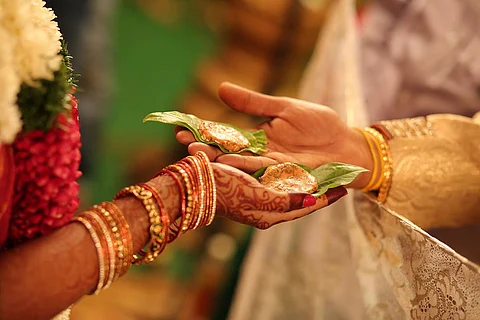

Three months ago, in October, 2020, in Ramanagara, about 44 km from Bengaluru, a 19-year-old girl was killed, allegedly by her own father, for having fallen in love with a man from another community. In early December, 2020, a young interfaith couple was forcibly separated. The man was arrested and the woman was forcibly placed in a shelter home despite repeated pleas from her that the marriage was consensual and that she loved him. The woman was then forced into a miscarriage. Last month, the BJP government in Uttar Pradesh brought in an ordinance that effectively attacked such interfaith marriages.
Last week, the Karnataka State Brahmin Development Board, under a BJP state government, launched a scheme for “Brahmin brides”, which assured a payment of Rs 3 lakh to poor Brahmin women who marry Brahmin priests in the state. According to the Chairman of the Board, the “bride” should fulfil other conditions that include requirements that it should be her first marriage and that the married couple will have to give an undertaking that they would remain married for a specified period of time.
This is coming about in the context of the BJP government announcing that they would bring in a law that would curb “love jihad”, which is in fact a law to curb love itself. Last week, Tejasvi Surya, the BJP MP from Bengaluru South while defending such a law said, "If a non-Muslim woman marries a Muslim man, they lose a lot of rights. Should we not speak for them and ensure that if in case they chose to marry, they are given legal protection?"
The pattern is obvious and intended. The ‘Hindutva’ project that seeks to bring back the law of Manu is premised on the control of women and their sexuality, othering non-Hindus and perpetuating the caste system.
In the words of Tejasvi Surya, it is based on the need to “speak for” Hindu women who are seen as incapable of being able to speak for themselves or of making their own choices on who to love or partner with. It is in furtherance of this project that the government criminalises love itself, incarcerates Muslim men and refuses to acknowledge the choices of women.
It is this ‘Hindutva’ project that reinforces the caste system by using taxpayers' money as an inducement for endogamy and the perpeteration of caste by incentivising the marriage of a Brahmin woman within her own community, trapping and imprisoning women by draconian specifications that require that she remain married “for a specified period of time”. The act of using public funds to enforce endogamy is not only an attack on women but an attack on society itself by seeking to preserve the wretched caste system.
These actions of the BJP in enforcing endogamy and criminalising love, have to be seen as two sides of the same coin. It seeks to perpetuate the patriarchy, control the sexuality and choices of women for the preservation of the caste system and objectifies women as “brides”, an appendix to ‘man’. The Manusmriti, which has a lot to say about the need to keep women in control, says among other things “Day and night women must be kept in dependence by the males (of) their (families), and if they attach themselves to sensual enjoyments, they must be kept under one’s control.” And further, “Her father protects (her) in childhood, her husband protects (her) in youth, and her sons protect (her) in old age; a woman is never for independence.”
Dr Ambedkar in his book Castes in India: Their Mechanism, Genesis and Development establishes that endogamy, i.e. enforcing marriage only within their own caste, is the chief characteristic of caste and traces the origin of caste to the origin of the mechanism of endogamy. He finds that it was with the intent to maintain endogamy that customs such as Sati, enforced widowhood and child marriage were brought in, and the control of the sexuality of the woman was necessary for the preservation of the caste-system.
Uma Chakravarthi in Gendering Caste notes how women are regarded as “… gateways – literally points of entry into the caste system”. That is, that a woman’s sexuality and sexual choices would have to be controlled to maintain endogamy, resulting in an “obsessive concern with controlling female sexuality and ensuring the reproduction of pure blood”.
The biggest threats to the caste-system and the Hindutva agenda is love as the premise for marriage and the choices articulated by women over their own sexualities. In fact, Dr Ambedkar while calling for the annihilation of caste, saw inter-caste marriage as one of means towards the same.
And thus they respond by criminalising love, reducing women from citizens who can make independent informed choices who speak for themselves to reproductive machines designed to preserve caste and bringing about state sponsored endogamy.
This is an assault on women, an assault on the Constitution and must be resisted.
Views expressed are the author's own.
Maitreyi Krishnan is an advocate practicing with Manthan Law in Bengaluru.